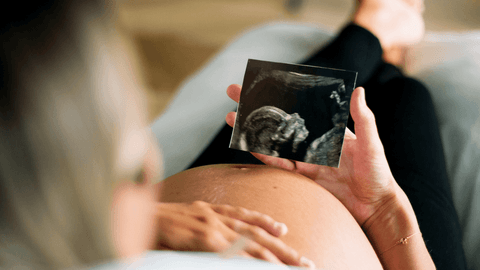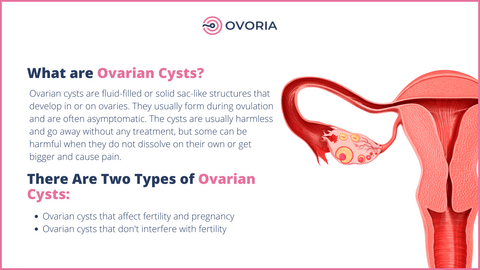Can I Get Pregnant with Ovarian Cyst?
Ovarian cysts affect mostly women of childbearing years because the menstrual cycle and the hormonal changes it causes in the body trigger them. A woman has two ovaries about the size and shape of an almond, one on each side of her uterus. The ovaries produce eggs (ovulation) and the hormones oestrogen and progesterone, and it also can affect pregnancy and menstrual cycles.

What are Ovarian Cysts?
Ovarian cysts are fluid-filled or solid sac-like structures that develop in or on ovaries. They usually form during ovulation and are often asymptomatic. The cysts are usually harmless and go away without any treatment, but some can be harmful when they do not dissolve on their own or get bigger and cause pain. There are chances of ovarian cancer, though rare, in a woman who has ovarian cysts.
There are two types of ovarian cysts:
- Ovarian cysts that affect fertility and pregnancy
- Ovarian cysts that don't interfere with fertility

Understanding the Types of Ovarian Cysts Which Affect Fertility
The cysts most harmful to fertility are ovarian cysts resulting from polycystic ovary syndrome and endometriomas – caused by endometriosis.
Endometrioma
In medical terms, an endometrial cyst is a type of cyst that forms when endometrial tissue abnormally grows in the ovaries. The endometrium is the mucous membrane that lines the inner layer of the uterine wall.
Endometrial cysts may be packed with dark, reddish-brown blood and may vary in size. They are also called chocolate cysts, and they can cause infertility.
Endometriosis
Endometriosis affects about 10% of all women, but not all of them have fertility problems. Some women with endometrioma may not experience any symptoms or pain. It's only detected during gynaecological examination through a vaginal ultrasound.
An endometrioma or chocolate cysts begin as a small lesion on the ovaries. It may remain tiny (just a few millimetres in size) and is not a cause for concern. However, some cysts grow large, and women can experience pain during the menstrual cycle. The larger the endometrioma, the more problematic it is for fertility. If an endometrioma ruptures, its contents can enter the pelvic cavity. This can cause ovaries to adhere to the fallopian tubes creating fertility blockages. Endometriomas are essentially benign masses of the same tissue that lines the uterus. They can affect the normal functioning of ovaries, and in severe cases, can lead to the removal of an affected ovary, which makes a female infertile.
Cysts from Polycystic Ovarian Syndrome
PCOS may be the most common cyst that creates problems for women trying to conceive. It can cause enlarged ovaries and the development of small ovarian cysts due to hormonal imbalance. Many women with polycystic ovary syndrome find it hard to get pregnant and have irregular periods, excess hair growth and acne. Their insulin resistance and obesity can also complicate their fertility and cause a hormonal imbalance.
Polycystic Ovary
If a woman is experiencing PCOS, she may have a problem becoming pregnant and are at higher risk of developing complications during pregnancy. However, it is possible to manage the symptoms, allowing many women with PCOS to become pregnant and have a healthy baby.
PCOS women struggle to get pregnant because of high levels of the male hormone androgen, which prevents the release of an egg (ovulation). The best way to reduce the risk of complications is to see your doctor if you have any symptoms.
Women with polycystic ovaries have to follow a healthy regimen to conceive, such as maintaining a healthy weight, healthy eating, exercising regularly, monitoring ovulation and planning sexual intercourse accordingly.
A doctor might prescribe fertility medicine if medications don't work. If that doesn't work either, a doctor might suggest getting surgery to remove a tiny amount of tissue that produces the excess male hormone in the ovaries. If a woman is not healthy enough to carry a child, complications during pregnancy might increase, such as miscarriages, high blood pressure induced by the pregnancy, gestational diabetes and even premature birth.
Understanding the Types of Ovarian Cysts Which Do Not Interfere With Fertility
These cysts may bleed and cause pain, but they will not affect one's fertility unless their size increases significantly.
Cystadenomas
They are benign growths in the ovary that develop from the tissues at the ovary. Although they require treatment, cystadenomas do not affect fertility.
Dermoid cysts
A type of tumour typically contains different tissues, including neural tissue, hair, teeth, bone, instead of fluid. Dermoid cysts do not cause infertility.
Functional ovarian cysts
A functional cyst is a kind of cyst that develops on the surface of the ovary during the menstrual cycle. In a typical case, the sac becomes small and dissolves once the egg is released. Most cysts don't need to be treated by a doctor; they disappear on their own within two menstrual cycles. Functional cysts do not cause infertility, and pregnancy can easily be achieved with a functional cyst.
However, if the cyst becomes too large, it may rupture and bleed, and in some cases, can cause ovarian torsion that will lead to excruciating pain. Ovarian torsion happens in the case of enlarged ovaries.
If not diagnosed in time, ovarian torsion can cause foetal death and even potential loss of the woman's fertility. So, a large cyst should be monitored to avoid any fatal consequences. Ruptured cysts can cause pelvic infection
Hemorrhagic cysts
A hemorrhagic cyst is a functional cyst that develops when the bleeding occurs in the cyst. Its symptoms include an abdominal cyst on one side of the body. The bleeding does not cause infertility.
Para Ovarian Cysts
Para ovarian cysts are fluid-filled cysts that are located close to the fallopian tube and ovary. If grown over a specific size, they might require some surgeries to treat these cysts.
How to Get Pregnant With Ovarian Cysts?
If a woman wants to become pregnant with ovarian cysts, she needs to have good health and a healthy lifestyle and eat a balanced diet. Several health conditions may upset her plans in becoming a mother by affecting fertility.
One type of health condition is the presence of ovarian cysts. Some ovarian cysts decrease fertility, but it depends on the type of cyst. There is also an increased chance of successful pregnancy after cyst removal.
Ovarian cysts are common in females who have irregular periods, and they usually form during ovulation. Hence, females must keep a regular check on their fertile window, and for this purpose, they can use an ovulation calculator.

